FREE Training: How to Launch Your Property Management Company
Are you looking to start your own New Jersey property management company? If so, you have come to the right place!
In this blog post, we will go over all of the steps that you need to take in order to successfully start your New Jersey property management company.
From registering your business to attracting a strong client base, we are here to help guide you through the beginning stages of your career in property management.
So, if you’re ready, let’s dive in!
What Does It Take to Be a New Jersey Property Manager?
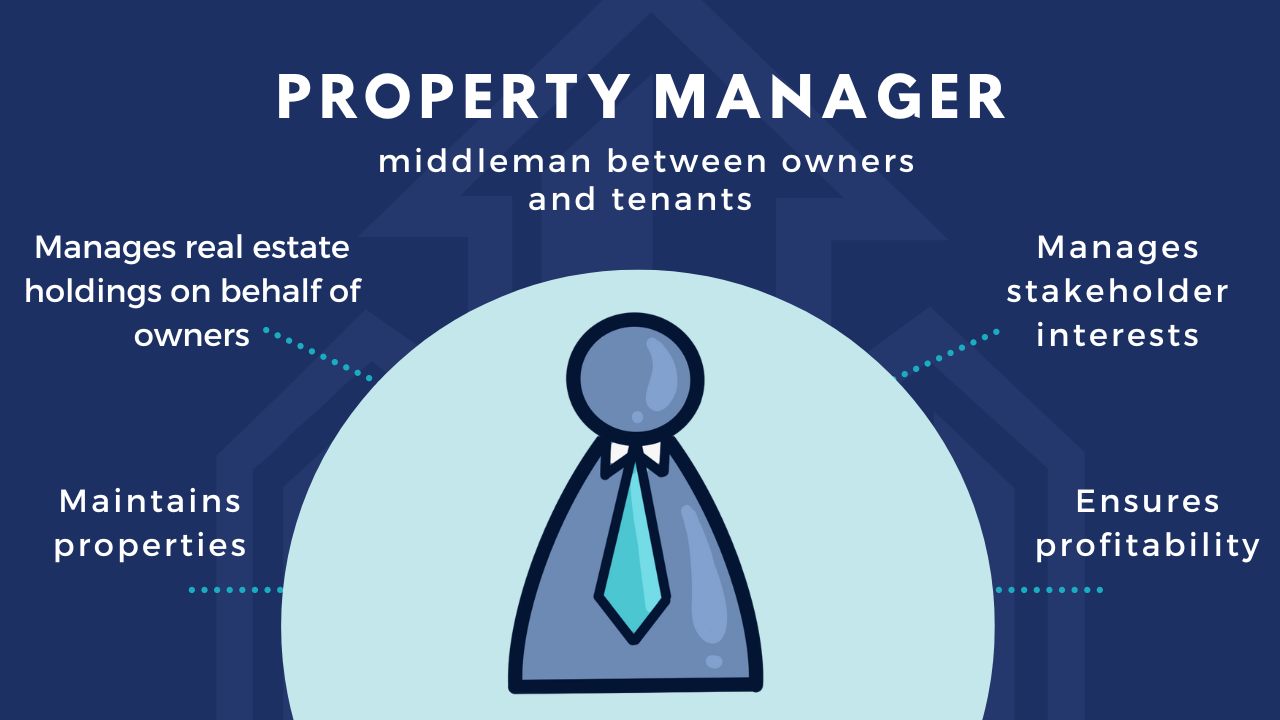
The truth is, being a property manager in New Jersey requires a diverse skill set and the ability to handle multiple responsibilities at once.
It involves overseeing the daily operations of rental properties, which includes tasks such as leasing, maintenance coordination, managing tenants, advertising properties, and financial management.
Effective communication skills are also crucial, as property managers often interact with tenants, property owners, contractors, and vendors.
In fact, you will find yourself regularly acting as a mediator between all of the parties that are involved with the rental property, making sure that everyone has their needs met.
Attention to detail is essential for when you are a property manager in New Jersey, as you will be managing budgets, ensuring compliance with regulations, and resolving disputes on a regular basis.
Adaptability and problem-solving abilities are also key, as property managers must address unexpected challenges promptly and efficiently.
Overall, being a property manager demands a blend of organization, communication skills, and a deep understanding of real estate operations to ensure that rental properties are remaining well-maintained and profitable.
Still interested? Let’s get into our step by step guide on how you can start your own property management company in New Jersey.
Step 1: Structure and Register Your New Business
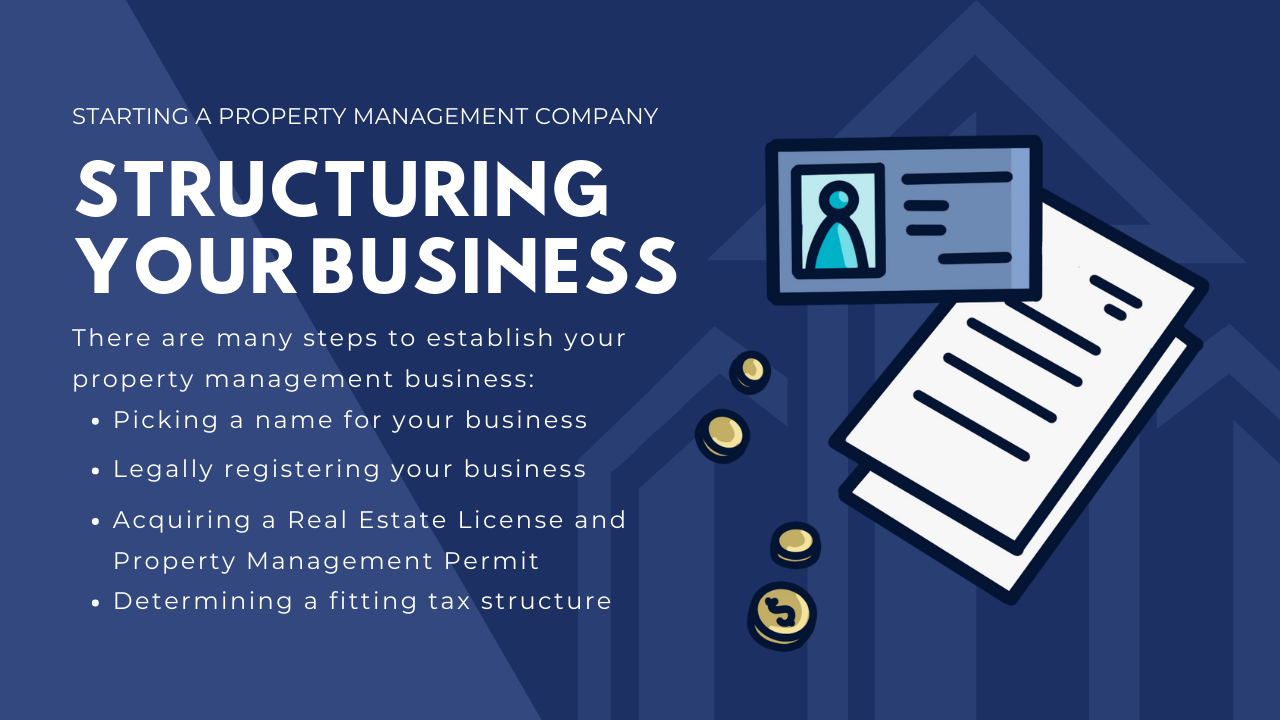
Your first step in starting your property management company is making sure you are qualified. In New Jersey, you will need a real estate license in order to legally work in property management.
Next, you’ll need to choose a name for your company and register it. Setting up a legal entity in New Jersey involves navigating specific regulations, which can be complex.
Consulting with a local corporate accountant is advisable to ensure compliance with state requirements.
FREE Training: How to Launch Your Property Management Company
Step 2: Create a Strong Contract for Your New Jersey Clients
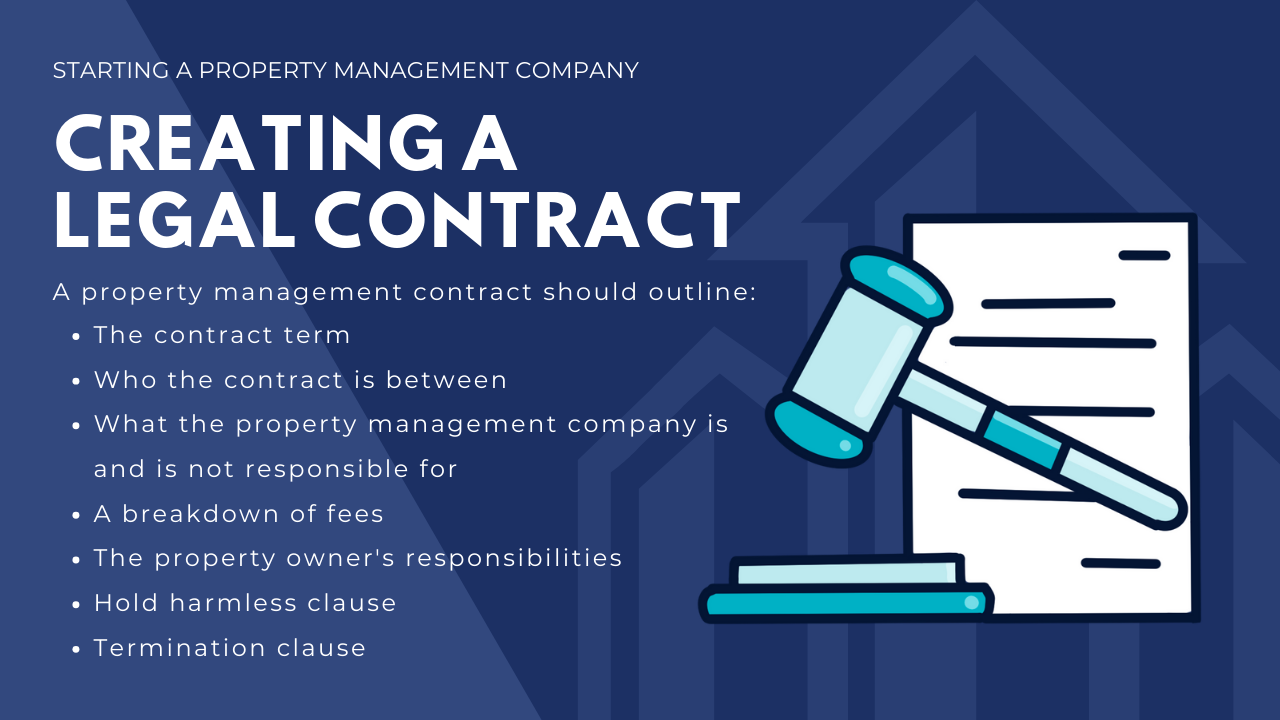
Writing a contract for your property management clients is essential if you want to establish clear expectations with your future client base and protect all parties involved.
Start by outlining the range of services that you will provide, such as tenant screening, rent collection, maintenance, and property inspections.
Specify the duration of the contract and renewal terms, along with the fees and payment schedule. Include clauses on responsibilities, such as maintenance responsibilities for both parties, and procedures for handling disputes or termination of the agreement.
As always, make sure the contract complies with New Jersey’s landlord-tenant laws and regulations to safeguard against legal issues.
Review the contract with your client to address any questions or concerns before both parties sign and make sure to hire a reputable lawyer to help you throughout this process.
FREE Training: How to Launch Your Property Management Company
Step 3: Create a Business Plan for Your New Jersey Property Management Company
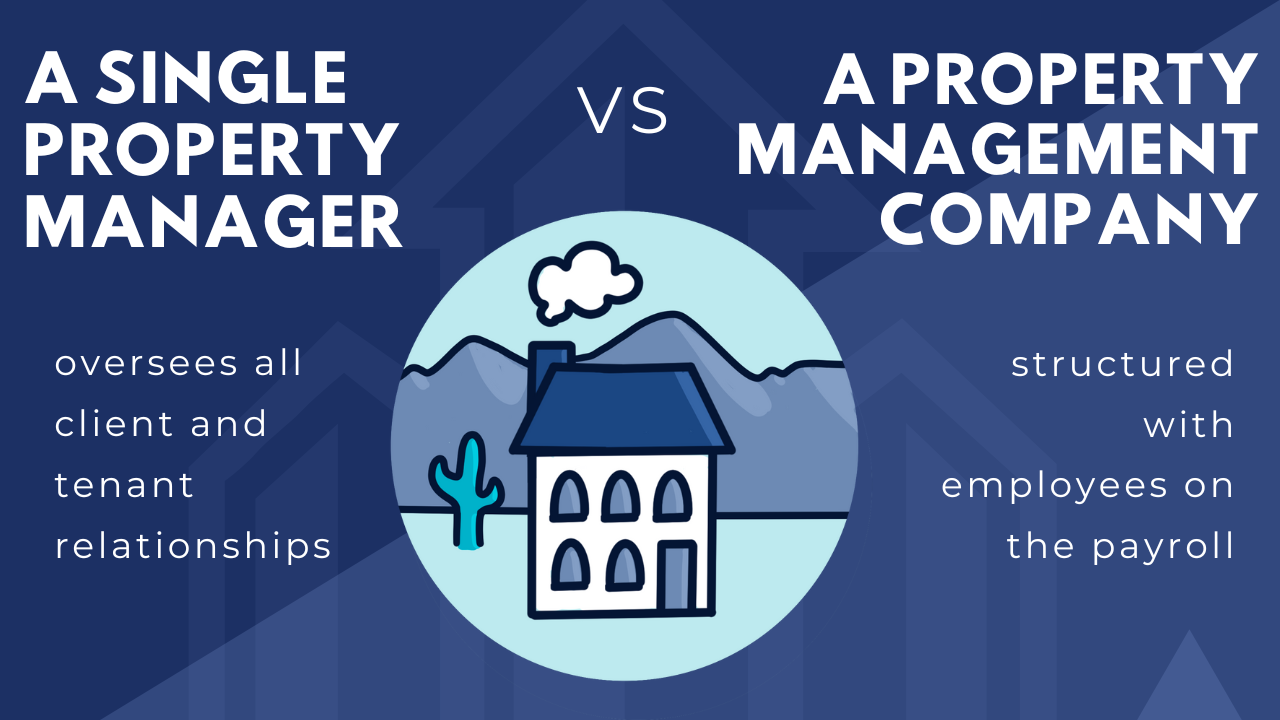
When establishing your property management business, it’s crucial to set both short-term and long-term goals and develop a scalable plan to help you achieve them.
Property management companies typically operate under two main structures: the first involves a single property manager, or sole proprietor, overseeing all client and tenant relationships, often outsourcing tasks to other businesses or contractors.
Alternatively, companies may opt for a structured setup with employees on payroll, ensuring tasks are evenly distributed and allowing each employee to specialize in specific aspects of the business.
While these are common structures, they are not fixed choices; many property managers begin as sole proprietors utilizing contractors, then evolve towards employing a team and establishing a clear business hierarchy as their client base expands.
FREE Training: How to Launch Your Property Management Company
Step 4: Find the Best Software for Your Company
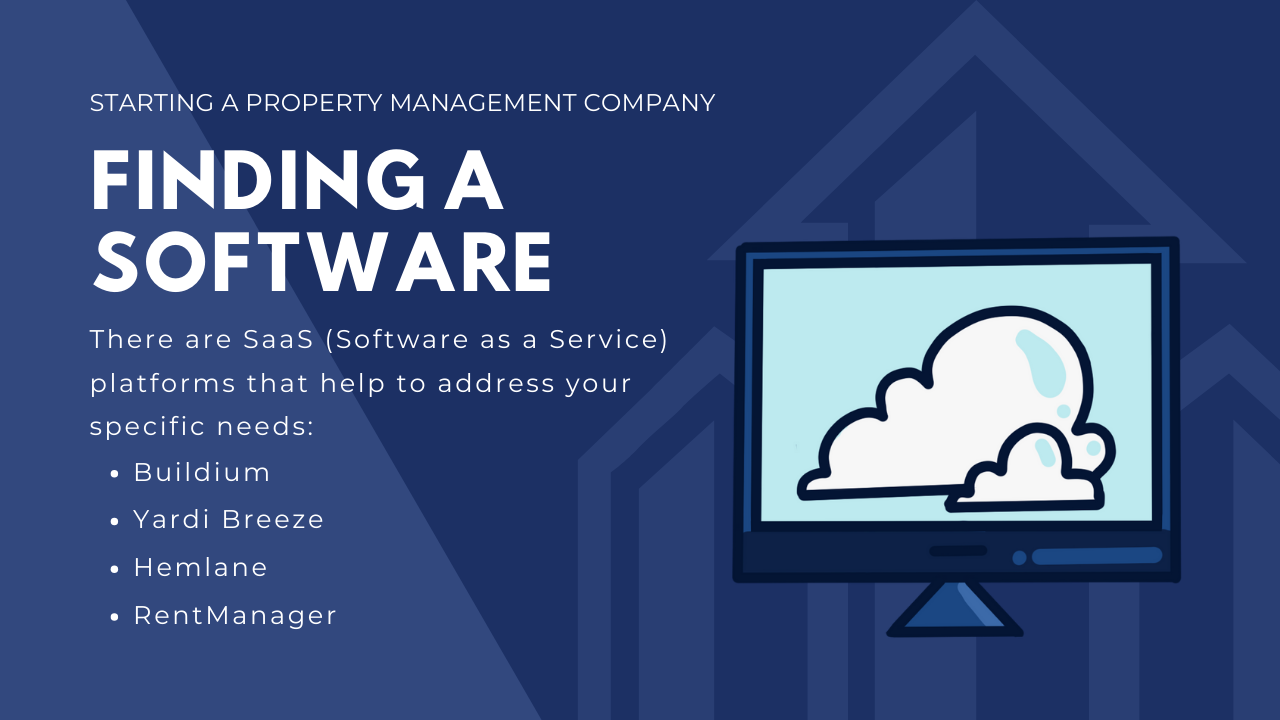
As a property manager, you are sure to find yourself handling multiple tasks at once and maybe even getting overwhelmed by your never ending to do list.
That’s why we highly recommend using a property management software to help you automate your work early on and stay on top of your responsibilities.
Property management software is extremely helpful for streamlining your operations, as you can automate tasks such as lease management, rent collection, and maintenance tracking.
It streamlines communication with tenants and property owners while providing detailed financial reporting and analytics to help you optimize a property’s performance.
By improving your efficiency, software allows property managers in New Jersey to focus more on strategic growth and delivering excellent service to clients.
Choosing the best software for your property management company in New Jersey involves thorough research and careful consideration of your specific business needs.
Begin by identifying the main functions that you need to start out with, such as tenant and lease management, maintenance tracking, and financial reporting.
Take advantage of demos and free trials offered by software providers to help you make the right investment.
Ultimately, selecting software that aligns with your scalability requirements and boosts your daily operations will contribute significantly to the success of your property management business.
Step 5: Market Your New Jersey Property Management Company

Marketing your property management company needs to be an ongoing priority if you want to really succeed in the long run.
New Jersey has a competitive rental property market, so it is important to always be doing your best to make your company as attractive to new clients and tenants as possible.
Many property management companies decide to hire a marketing professional to help them get the most out of their advertising efforts.
Our team at Upkeep Media has helped hundreds of property management companies improve their marketing strategies and attract a larger client base, and we are confident that we can do the same for you.
In our experience, the following tools should be the main pillars in your marketing strategy for your New Jersey property management company:
A Professional Website: without a website, your marketing strategy will not have a home base to help convert leads into real clients. Make sure to invest in a high quality website that is full of valuable content such as blog posts, client testimonials, and photos of properties under your care.
Strong Marketing Content: In addition to the content on your website, you should be plugged into as many social media platforms as you can manage, such as LinkedIn, Facebook, and Instagram. This will help you reach new leads and strengthen your online presence and SEO.
Networking: Networking with your local real estate community is one of the best ways to get connected with new potential clients. While online marketing is essential in this day and age, making an effort to meet your fellow professionals in real life can do wonders for your business.
FREE Training: How to Launch Your Property Management Company
Step 6: Decide What Your Fee Structure Will Look Like
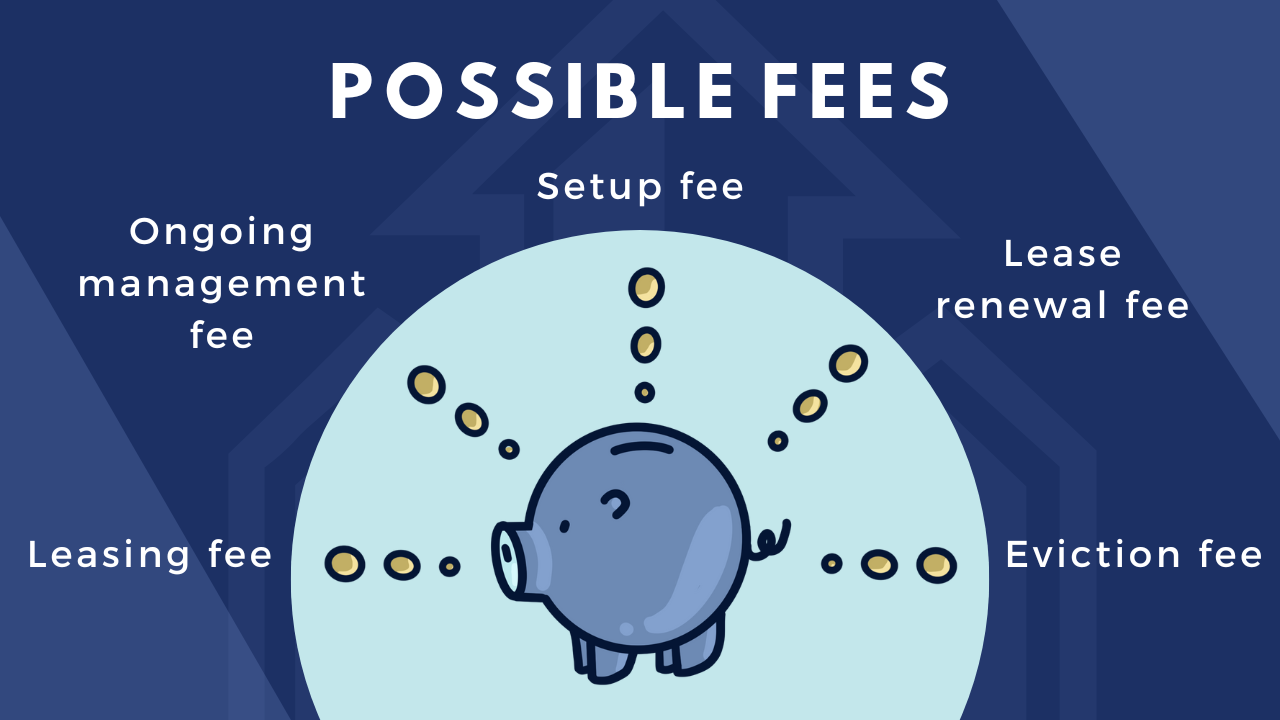
Once you have defined your business structure and started attracting clients, the next crucial step is establishing your fee structure.
Finding the right balance for how much to charge for your property management services is key.
Setting prices too low can undermine your company’s credibility and put a strain on your profitability. On the other hand, pricing your services too high might deter potential clients.
Conducting thorough market research in your local area to understand competitor pricing and industry norms is essential.
Additionally, look into different fees and payment structures that are prevalent in your specific market, rather than relying solely on general online guidelines.
Consider fees such as setup fees for client accounts, ongoing management fees based on rental income percentages, leasing fees for vacant units, lease renewal fees, and optional eviction fees.
Lastly, prioritize delivering consistent, high-quality service to uphold your business’s reputation and maximize your profitability.
Starting your own property management company in New Jersey is a daunting yet exciting journey that requires careful planning, dedication, and a strategic approach.
By following the steps that we have listed above, such as defining your business structure, attracting clients, and setting up a strong fee structure, you can establish a solid foundation for long term success.
Remember, true success in property management hinges on building strong relationships, maintaining high quality service, and continuously adapting to meet the evolving needs of property owners and tenants alike.
With a strong work ethic and a commitment to excellence, you can navigate the challenges and opportunities of the New Jersey property market and thrive.
At the end of the day, even with the best property management services on the market, you won’t be able to gain a client base if you don’t market your company correctly.
Luckily, that’s where we come in! If you have any questions about how you can best market your New Jersey property management company, contact our team at Upkeep Media.
FREE Training: How to Launch Your Property Management Company



